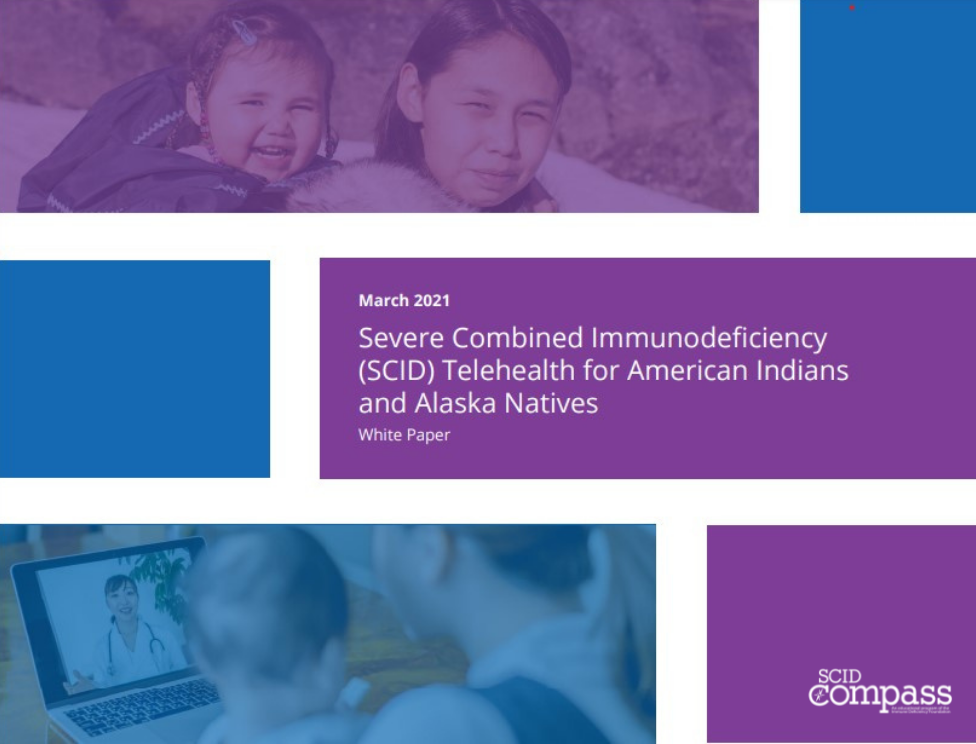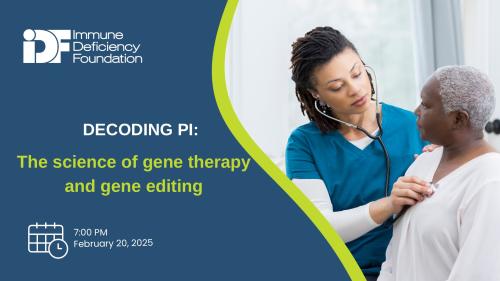
-
Understanding primary immunodeficiency (PI)

Understanding PI
The more you understand about primary immunodeficiency (PI), the better you can live with the disease or support others in your life with PI. Learn more about PI, including the various diagnoses and treatment options.
-
Living with PI
-
Addressing mental health
-
Explaining your diagnosis
- General care
- Get support
- For parents and guardians
-
Managing workplace issues
- Navigating insurance
-
Traveling safely

Living with PI
Living with primary immunodeficiency (PI) can be challenging, but you’re not alone—many people with PI lead full and active lives. With the right support and resources, you can, too.
-
Addressing mental health
-
Get involved

Get involved
Be a hero for those with PI. Change lives by promoting primary immunodeficiency (PI) awareness and taking action in your community through advocacy, donating, volunteering, or fundraising.
-
Advancing research and clinical care
-
Grants
-
IDF surveys
-
Participating in clinical trials
-
Diagnosing PI
-
Consulting immunologist
-
Clinician education

Advancing research and clinical care
Whether you’re a clinician, researcher, or an individual with primary immunodeficiency (PI), IDF has resources to help you advance the field. Get details on surveys, grants, and clinical trials.
-
Grants
American Indian and Alaska Native communities experience a higher proportion of infants born with severe combined immunodeficiency (SCID). Many families live hundreds of miles from SCID treatment centers, resulting in major gaps in care for these populations. A recently prepared report by RTI, a SCID Compass partner, examines how telehealth can address those health disparities for children with SCID.

Telehealth includes services such as:
- Virtual doctor visits
- Sharing test results electronically from doctor to patient
- Sharing regular health data from patient to doctor
- Sending health reminders via text to patients
Several barriers to telehealth exist for the communities. Some families don’t have computers or lack access to the internet and must drive far distances to find broadband access. Others face literacy challenges and find technology inaccessible. Others prefer face-to-face meetings rather than navigating virtual appointments, and they mistrust providers. Even if families can utilize technology for healthcare, privacy challenges exist either at their homes or at local clinics where they need to communicate virtually with specialists.
Some solutions offered up by the report include:
- Partner smaller clinics with larger health organizations for better resources
- Hire telehealth champions to facilitate processes
- Add culturally competent staff members and expand facilities and equipment
- Provide patients with supplies like electronic blood pressure cuffs and scales, and higher resolution cell phone cameras, in an effort to better transmit patient data
- Prepare a physical space at the local clinic to provide privacy
- Provide staff for mental health services or coordination of social work
The report also indicated that health insurance policies need updates and laws dictating which states medical providers may practice in required changes.
“Expanded medical licensure laws that allow interstate telehealth treatment for SCID can ensure that these patients have access to the proper providers for their treatment. This is especially important in states like Arizona, New Mexico, and Nevada, where many SCID patients live, and California, where SCID providers reside,” according to the report.
Adequate housing is another area that policymakers must address for families to get the full benefit of telehealth services.
“Housing is especially important—SCID patients are at increased risk of infection and need electricity, proper ventilation, and plumbing to mitigate this risk. Expanding coordination and coverage of these services will ensure that all SCID patients and their families have their non-medical needs addressed and can focus on seeking the best-quality medical care,” said the report.
Overall, the report urged the integration of telehealth into care for children with SCID so that they may have access to the doctors required to treat this rare primary immunodeficiency.
“SCID patients in the American Indian and Alaska Native communities commonly seek care in other states, where providers specialize in the most effective treatments. Traveling to these visits can be burdensome to the patient and their family due to the associated time, costs, and risk of infection. Offering treatments and consultations via telehealth can dramatically increase access to high-quality care for tribal SCID patients,” concludes the report.
To read the entire report, click here.
Related resources
Sign up for updates from IDF
Receive news and helpful resources to your cell phone or inbox. You can change or cancel your subscription at any time.





The Immune Deficiency Foundation improves the diagnosis, treatment, and quality of life for every person affected by primary immunodeficiency.
We foster a community that is connected, engaged, and empowered through advocacy, education, and research.
Combined Charity Campaign | CFC# 66309




